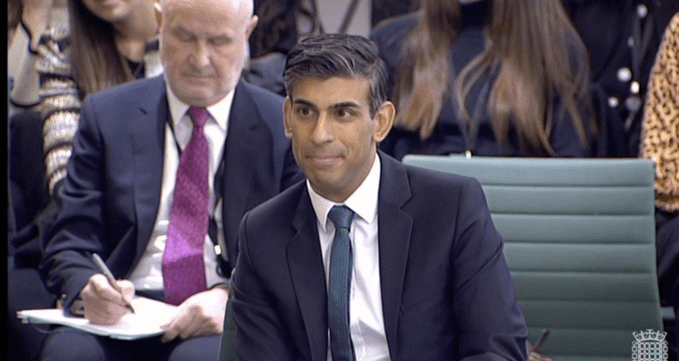‘Nothing has changed’ – the words of Theresa May could have been tattooed on Rishi Sunak’s forehead this afternoon. Appearing before the liaison committee for the first time, the new Prime Minister sought to convey an impression of authority. He deliberately tried to downplay issues of potential conflict like a second independence referendum and rigidly stuck to the government line on strikes and spending restraint.
Sunak made much of his inexperience – dropping in several references to only having held the premiership for seven weeks – and ducking a question from Joanna Cherry on leaving the European Convention on Human Rights by saying he ‘wasn’t in government’ at the time that Suella Braverman suggested the government might have to withdraw. It was a stark contrast from the last time this committee met back in July, when Boris Johnson made his last, chaotic appearance in the final hours of his doomed regime. Liz Truss didn’t even survive long enough to appear before a session.
Here are the five main takeaways from today’s liaison committee meeting:
- Fuel duty likely to go up in the spring
Fuel duty has been frozen since the Conservatives returned to power in 2010 but it is now likely to soar by as much as up to 12p a litre in the spring after Sunak failed to rule out a hike in prices. Harriet Baldwin, who chairs the Treasury Select Committee, pointed out that the Chancellor’s Autumn Statement assumes that fuel duty is going to rise by that amount next April. ‘Surely you would want to confirm today to the committee that’s not going to happen?’ she asked him.
Sunak’s reply was non-committal: ‘Having previously had his [the Chancellor’s] job, I always preferred it when the Prime Minister made absolutely no comment about future tax policy, so I will very much adhere to that.’ He ducked a second attempt at answering the question when Baldwin pressed him: ‘Tax decisions are those that are made by the Chancellor in fiscal statements and that’s how it should be.’
2. The government is ‘increasingly concerned’ about Iran
Sunak is still, rightly or wrongly, seen as something of a foreign policy novice in Westminster, with little known about his world view. It was interesting therefore to hear the Prime Minister remark upon the situation in Iran and Tehran’s activities abroad. ‘Whilst Russia and Ukraine remain our number one foreign policy challenge as we go into the new year, I am increasingly concerned about Iran’s behavior,’ he said, adding that ‘it is something we will need to spend an increasing amount of time on, going forward.’
3. No commitments on leaving the ECHR
In a protracted exchange with the SNP’s razor-sharp Joanna Cherry, Sunak declined the chance to go as far as Dominic Raab in suggesting that ‘nothing is off the table’ in dealing with illegal immigration – including leaving the European Convention on Human Rights. He merely contented himself with saying that he’s been clear in wanting to deliver an immigration system ‘which means that when someone comes here illegally, they don’t have the right to stay.’
The Prime Minister refused to be drawn on whether the UK will need to leave the ECHR, adding that legislation will be introduced next year that he’s confident will deliver on the system he wants to put in place in relation to immigration. He also declined to put a figure on the number of people who will be sent to Rwanda by the end of 2023, citing ‘commercial’ reasons.
4. No budging on NHS pay deal
Sunak was asked about NHS strikes by Sir Bernard Jenkin. Unsurprisingly, he opted not to deviate from the government line, insisting that the pay review bodies took into account the likely impact of inflation and that the focus of staff ought to be on cutting backlogs. Asked to give a ‘personal message to NHS workers who are going on strike’, Sunak spoke of his gratitude to staff but added that getting control of inflation was important too. He continued:
If we get it wrong and we’re still dealing with high inflation in a year’s time, that’s not going to help anybody. I don’t want to see that, I want to see things get back to normal, and that’s why having an independent pay process is an important part of us making those decisions and getting them correct.
5. Sunak ‘hopeful’ about a new ethics advisor
Amid a recent string of sleaze stories, Sunak was asked about when a new Independent Adviser on Ministers’ Interests will be appointed. The post has been vacant since June when Lord Geidt tendered his resignation over concerns about whether the then Prime Minister Boris Johnson had lied about Partygate. Sunak told MPs that he is ‘hopeful’ about being able to appoint someone soon. He added that it was important to get the right person for the job.







Comments